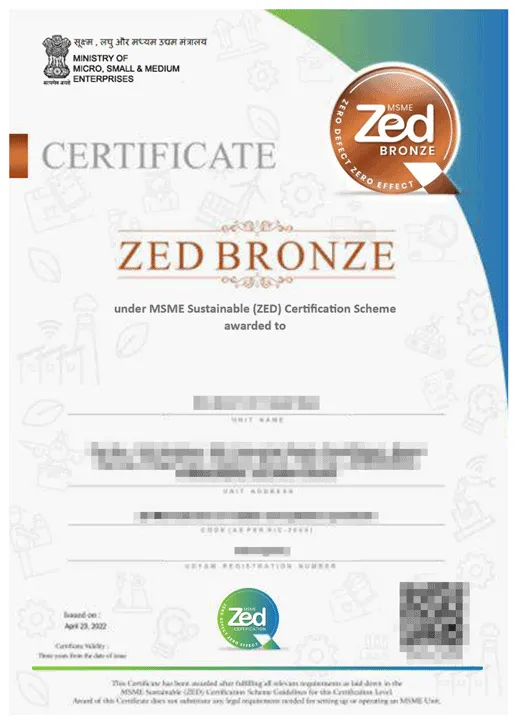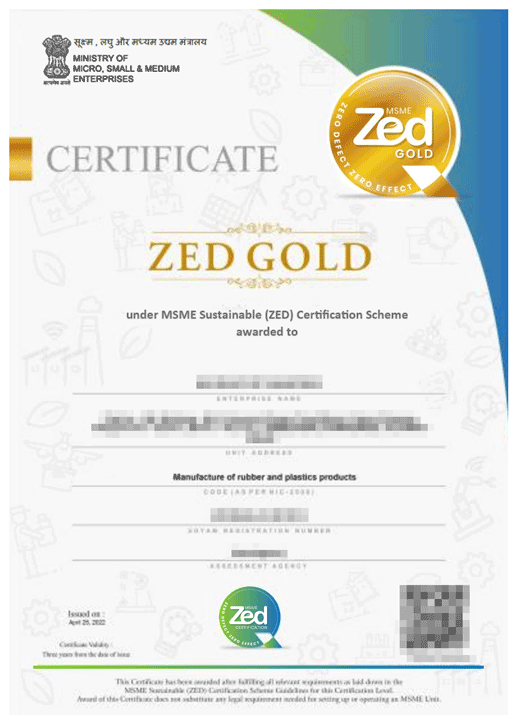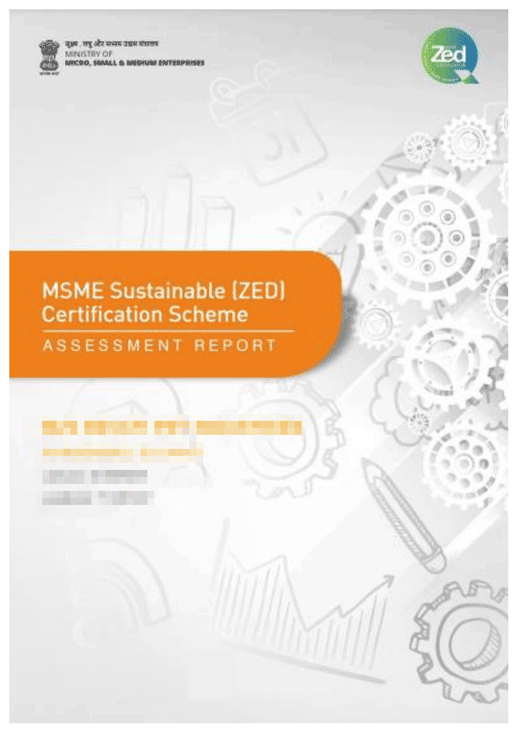Updated on February 23, 2026 07:10:12 AM
ZED Certification in Meghalaya is a quality check certificate issued by the government to MSMEs. The Zero Defect Zero Effect module encourages MSMEs to balance economic development with sustainability. MSMEs exhibit their commitment towards consumers by obtaining the ZED Certificate. In Meghalaya, the ZED Certification process usually takes up to 60 days and is dependent on the MSMEs' eligibility and their readiness. Certification requires MSMEs in the state to evaluate their standards and upload their evidence.
Several state-based MSMEs engaged in floriculture, beekeeping, spice, fruit, and other processing units need to obtain ZED Certification at large, as per their level of preparedness. MSMEs who register themselves for ZED Certification gain access to many monetary incentives and easy loans and are often seen by the market as a trusted brand. Certification involves various audits on ZED parameters.
MSMEs in Meghalaya need to comply with quality control, keeping the risk of ecological hazards in mind. Further, MSMEs are expected to provide a safe environment to work in, set up waste management systems, and implement energy-efficient measures. We can conclude that ZED Certification in Meghalaya is the ultimate need for MSMEs who want to give wings to their units rather than crawl. It is a significant measure for MSMEs in the era of the trade boom and gives them global recognition.
ZED Certificate Sample




Table of Content

ZED Certificate is an MSME certification scheme under the Ministry of MSMEs. MSMEs who intend to trade across the domestic and international markets need to comply with industry standards and safety regulations. Usually valid for 3 years, the ZED Certificate needs renewal, and a fresh audit is done after the said timeline. The Zero Defect, Zero Effect policy is a major guideline for processing units to implement. Audit inspections in MSMEs are conducted every so often based on consumer feedback. ZED Certification regulates MSMEs to minimise the environmental impacts and encourage quality standards in their respective units.

Here are the types of ZED Certification available for MSMEs in Meghalaya: Bronze, Silver, and Gold. Each level highlights a business’s commitment to quality, sustainability, and eco-friendly practices, helping MSMEs in Meghalaya enhance their reputation and competitiveness:-

The ZED (Zero Defect Zero Effect) Certificate offers multiple benefits to Micro, Small, and Medium Enterprises (MSMEs) by enhancing their quality standards, sustainability, and competitiveness.

To apply for ZED Certification in Meghalaya, MSMEs need to submit the required documents for ZED Certification to ensure a smooth verification process and compliance with local and national regulatory standards.

The process of obtaining a ZED Certificate in Meghalaya, guided by the Ministry of MSME, is simple and structured, enabling MSMEs to apply smoothly and meet compliance requirements.

Here are the ZED Certification Fees in Meghalaya. Fees vary by certification level, ensuring industries of all sizes can obtain certification.
| Certification Level | Government Fee | Professional Fees |
|---|---|---|
| BRONZE | Rs. 10,000/- | Rs. 15,000/- |
| SILVER | Rs. 40,000/- | Rs. 25,000/- |
| GOLD | Rs. 100,000/- | Rs. 50,000/- |
Note: The above fees are exclusive of GST.

The Zero Defect Zero Effect (ZED) Certification Scheme grants MSMEs the ZED Bronze Certificate, which is normally valid for three years after the date of issuance. The business must apply for renewal or upgrade to a higher-level certification, such as Silver, Gold, Diamond, or Platinum, after the validity period has passed.
This validity guarantees that MSMEs will consistently uphold quality standards, implement sustainable practices, and continue to qualify for government assistance and incentives under the ZED program. Frequent renewal also encourages businesses to progressively enhance their operations and advance toward worldwide competitiveness.

The ZED (Zero Defect Zero Effect) Certificate is awarded to MSMEs in Meghalaya based on a set of well-defined parameters that assess their commitment to quality, sustainability, and efficient business practices.

The ZED Certification (Zero Defect Zero Effect Certification) is more than just a quality mark it is a step towards excellence, sustainability, and global competitiveness for MSMEs in India. By obtaining this certification, enterprises showcase their commitment to producing zero-defect products with zero effect on the environment, while also gaining customer trust, government incentives, and international recognition.
From registration and documentation to assessment and certification, the process encourages businesses to adopt best practices in quality management, safety, and eco-friendly operations.

Frequently Asked Questions
ZED (Zero Defect Zero Effect) is an MSME certification by the Government of India that helps small businesses in Meghalaya produce high-quality products with minimal environmental impact. The process includes guidance and support to improve quality, safety, sustainability, and competitiveness.
ZED stands for Zero Defect, Zero Effect, which means making products without defects while keeping the environment safe. The scheme aims to boost product quality while ensuring sustainability and ecological responsibility.
Bronze Level: Approx. ₹10,000 (government fee)
Silver Level: Approx. ₹40,000 (government fee)
Gold Level: Approx. ₹90,000 (government fee)
In addition, many MSMEs in Meghalaya may incur professional fees for consultant or handholding support, which vary depending on the certifying agency.
Yes. ZED Certification enhances credibility, opens up government subsidies, improves product quality, and reduces rejections or returns for MSMEs in Meghalaya.
It also helps businesses adopt modern practices for safety, environment, and efficiency, which can lower long-term costs and improve market competitiveness.
Speak Directly to our Expert Today

Reliable

Affordable

Assured